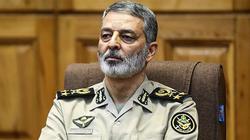 Iran’s Army chief has dismissed US President Donald Trump's threat to hit scores of Iranian sites, saying the Americans lack the "courage" to make good on such a spurious promise.
Iran’s Army chief has dismissed US President Donald Trump's threat to hit scores of Iranian sites, saying the Americans lack the "courage" to make good on such a spurious promise. RNA - The remarks by Major General Abdolrahim Mousavi on Sunday came a day after Trump threatened to target 52 sites, some "at a very high level & important to Iran & the Iranian culture" if Tehran avenged US assassination of a top military commander.
"They make such comments in order to save face after their ugly and unjustified act" of assassinating Iran's Quds Force commander General Qassem Soleimani in Iraq, Mousavi said.
"In a likely conflict which I doubt they have the courage to initiate, it would be determined to which side these 5 and 2 digits belong," he added.
In his tweet on Saturday, Trump said the targets represented 52 Americans who were held in Iran for acts of espionage following the 1979 takeover of the US embassy in Tehran by revolutionary students .
Iran's Foreign Minister Mohammad Javad Zarif took to Twitter Sunday to denounce Trump's "new breaches of JUS COGENS," referring to peremptory norms of international law.
"Targeting cultural sites is a WAR CRIME; -Whether kicking or screaming, end of US malign presence in West Asia has begun," he said.
Those masquerading as diplomats and those who shamelessly sat to identify Iranian cultural & civilian targets should not even bother to open a law dictionary.
Jus cogens refers to peremptory norms of international law, i.e. international red lines. That is, a big(ly) "no no".
— Javad Zarif (@JZarif) January 5, 2020
"Those masquerading as diplomats and those who shamelessly sat to identify Iranian cultural & civilian targets should not even bother to open a law dictionary," he added.
Iran's Minister of Information and Communications Technology (ICT) Mohammad Javad Azari also said Trump is "a terrorist in a suit."
Like ISIS, like Hitler, Like Genghis!
They all hate cultures. Trump is a "terrorist in a suit". He will learn history very soon that NOBODY can defeat "the Great Iranian Nation & Culture".#HardRevenge#QasemSoleimani https://t.co/N2iQ5AMX7M
— MJ Azari Jahromi (@azarijahromi) January 5, 2020
General Soleimani was an international figure who played a leading role in promoting security in regional countries, particularly in Iraq and Syria.
He was assassinated along with Abu Mahdi al-Muhandis, the second-in-command of Iraq’s Popular Mobilization Units (PMU) or Hashd al-Sha’abi.
Both commanders were admired by Muslim nations for eliminating the US-sponsored Daesh terrorist group in the region.